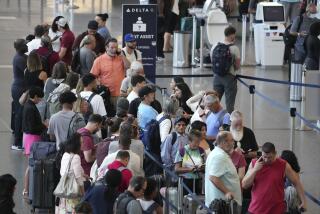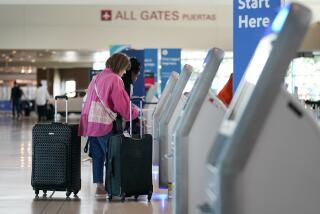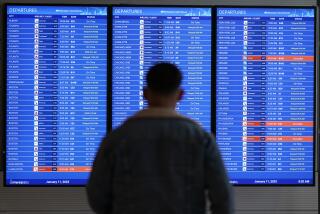Airlines Seek Additional Aid From Congress
- Share via
WASHINGTON — The debt-ridden U.S. airline industry will be near ruin if the government does not help it reduce insurance costs, taxes and other expenses related to aviation security, the chief executive of the world’s biggest carrier warned Congress on Tuesday.
“Without relief, our efforts to control our own costs will likely be futile,” Donald Carty, chairman and CEO of AMR Corp., parent of American Airlines, told the House aviation subcommittee.
He also warned that any U.S. war with Iraq was a “financially chilling” prospect because of the potential for sharply higher fuel costs and weaker demand that would magnify the effect of other financial problems.
“Such an event really would put a financial burden on this industry that would inevitably sink several carriers,” Carty said.
US Airways Group Inc. is in bankruptcy protection, and UAL Corp.’s United Airlines may go that route this quarter.
Airlines received a $15-billion bailout from Congress last year in the form of cash and loan guarantees to recoup losses from the Sept. 11 hijack attacks and the subsequent shutdown of the nation’s commercial aviation system.
Leading House Republican and Democratic lawmakers said they would work quickly to fashion an aid bill on some of the industry’s money-saving proposals. Similar legislation also is taking shape in the Senate.
Airline shares continued their slide Tuesday on fears of higher fuel prices and the dire industry warnings coming from Capitol Hill. Shares of AMR closed down 62 cents, or 15%, to $3.60. Continental Airlines declined 83 cents, or 14%, to $4.92. Delta Air Lines dropped $1.24, or 11%, to $10.06. UAL fell 22 cents, or 9%, to $2.12, all on the New York Stock Exchange.
Taxes, war-risk liability insurance, unfunded mandates for aircraft security upgrades and other costs have had a devastating effect on the bottom line at many big airlines, Delta CEO Leo Mullin told lawmakers.
The cost of aviation security in terms of direct expenses and lost revenue will total about $4 billion in 2002, he said. The figure could account for 35% of the industry’s pretax operating losses this year, Mullin added.
By comparison, the government has paid more than $6 billion since the Sept. 11 attacks to overhaul aviation security, including new passenger and baggage screening operations at 429 airports.
The industry, arguing aviation security should be a function of national security, asked Congress on Tuesday to eliminate the security tax of up to $10 per round trip assessed on tickets last spring. Airlines say they are unable to pass along the cost of the security fee to customers because of high costs and price pressures from discount carriers.
Major airlines lost $7.7 billion last year, and Wall Street estimates they could lose $5.7 billion to $7 billion in 2002 and as much as $3.3 billion in 2003. Many big airlines have taken on enormous debt just to survive, Carty said.
Mullin said security delays, which he calls the “hassle factor,” have driven air passengers away, especially on trips of 300 miles or less. “We are losing it to a brand-new competitor, the automobile.”
More to Read
Inside the business of entertainment
The Wide Shot brings you news, analysis and insights on everything from streaming wars to production — and what it all means for the future.
You may occasionally receive promotional content from the Los Angeles Times.










